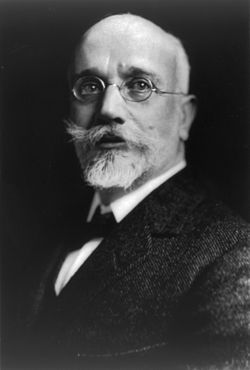Eleutherios Venizelos
| Eleftherios Venizelos Ελευθέριος Βενιζέλος |
|
|---|---|
 |
|
| Prime Minister of Greece | |
|
In office 6 October 1910 – 25 February 1915 |
|
| Monarch |
George I Constantine I |
| Preceded by | Stefanos Dragoumis |
| Succeeded by | Dimitrios Gounaris |
|
In office 10 August 1915 – 24 September 1915 |
|
| Monarch | Constantine I |
| Preceded by | Dimitrios Gounaris |
| Succeeded by | Alexandros Zaimis |
|
In office 14 June 1917 – 4 November 1920 |
|
| Monarch | Alexander |
| Preceded by | Alexandros Zaimis |
| Succeeded by | Dimitrios Rallis |
|
In office 24 January 1924 – 19 February 1924 |
|
| Monarch | George II |
| Preceded by | Stylianos Gonatas |
| Succeeded by | Georgios Kafantaris |
|
In office 4 July 1928 – 26 May 1932 |
|
| President |
Pavlos Kountouriotis Alexandros Zaimis |
| Preceded by | Alexandros Zaimis |
| Succeeded by | Alexandros Papanastasiou |
|
In office 5 June 1932 – 4 November 1932 |
|
| President | Alexandros Zaimis |
| Preceded by | Alexandros Papanastasiou |
| Succeeded by | Panagis Tsaldaris |
|
In office 16 January 1933 – 6 March 1933 |
|
| President | Alexandros Zaimis |
| Preceded by | Panagis Tsaldaris |
| Succeeded by | Alexandros Othonaios |
| Prime Minister of the Cretan State | |
|
In office 2 May 1910 – 6 October 1910 |
|
| Preceded by | Alexandros Zaimis (as High Commissioner) |
| Minister of Justice and Minister of Foreign Affairs of the Cretan State | |
|
In office 1908–1910 |
|
| Minister of Justice of the Cretan State | |
|
In office 17 April 1899 – 18 March 1901 |
|
| Personal details | |
| Born |
23 August 1864 Mournies, Chania, Crete, Ottoman Empire (now Eleftherios Venizelos, Crete, Greece) |
| Died | 18 March 1936 (aged 71) Paris, France |
| Nationality | Greek |
| Political party | Liberal Party |
| Spouse(s) | Maria Katelouzou (1891–1894) Elena Skylitsi (1921–1936) |
| Relations | Constantine Mitsotakis (nephew) |
| Children | Kyriakos Venizelos Sophoklis Venizelos |
| Alma mater | National and Kapodistrian University of Athens |
| Profession |
Politician Revolutionary Legislator Lawyer Jurist Journalist Translator |
| Religion | Greek Orthodoxy |
| Signature | |
| Website | National Foundation Research "Eleftherios K. Venizelos" |
Eleftherios Kyriakou Venizelos (full name Elefthérios Kyriákou Venizélos, Greek: Ελευθέριος Κυριάκου Βενιζέλος; pronounced [elefˈθerios cirˈʝaku veniˈzelos]; 23 August 1864 – 18 March 1936) was an eminent Greek leader of the Greek national liberation movement and a charismatic statesman of the early 20th century remembered for his promotion of liberal-democratic policies. As leader of the Liberal Party, he was elected several times as Prime Minister of Greece, serving from 1910 to 1920 and from 1928 to 1933. Venizelos had such profound influence on the internal and external affairs of Greece that he is credited with being "the maker of modern Greece", and is still widely known as the "Ethnarch".
His first entry into the international scene was with his significant role in the autonomy of the Cretan State and later in the union of Crete with Greece. Soon, he was invited to Greece to resolve the political deadlock and became the country's Prime Minister. Not only did he initiate constitutional and economic reforms that set the basis for the modernization of Greek society, but also reorganized both army and navy in preparation of future conflicts. Before the Balkan Wars of 1912–1913, Venizelos' catalytic role helped gain Greece entrance to the Balkan League, an alliance of the Balkan states against Ottoman Turkey. Through his diplomatic acumen, Greece doubled its area and population with the liberation of Macedonia, Epirus, and most of the Aegean islands.
In World War I (1914–1918), he brought Greece on the side of the Allies, further expanding the Greek borders. However, his pro-Allied foreign policy brought him into direct conflict with the monarchy, causing the National Schism. The Schism polarized the population between the royalists and Venizelists and the struggle for power between the two groups affected the political and social life of Greece for decades. Following the Allied victory, Venizelos secured new territorial gains, especially in Anatolia, coming close to realizing the Megali Idea. Despite his achievements, he was defeated in the 1920 General Election, which contributed to the eventual Greek defeat in the Greco-Turkish War (1919–22). Venizelos, in self-imposed exile, represented Greece in the negotiations that led to the signing of the Treaty of Lausanne, and the agreement of a mutual exchange of populations between Greece and Turkey.
...
Wikipedia
